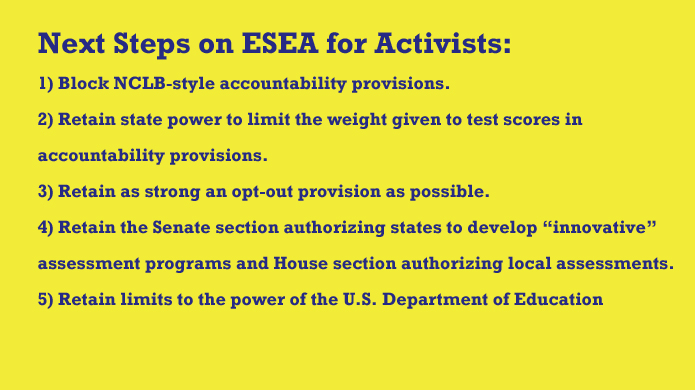Next Steps for Test Reform Activists on ESEA Reauthorization

By Monty Neill.
Testing resistance and reform activists can help determine the result of the House-Senate conference committee that will write a compromise bill to reauthorize the Elementary and Secondary Education Act (ESEA, now named No Child Left Behind).
Both houses of Congress took important steps to end federally mandated accountability, but failed to reduce the amount of required testing. While they do little to advance high-quality education, the bills are a valuable step forward in overhauling the testing and accountability regime that has undermined public education. The new shared version written by the conference committee this fall will go back to each chamber for final votes and then, if approved, on to President Obama for his signature. If a bill does not become law in this Congress, NCLB and the waivers will continue until at least 2017.
FairTest has analyzed the bills (see here) and will work toward these goals in conference:
1) Block NCLB-style accountability provisions. This is the most contentious accountability issue. The Senate rejected a Democratic amendment that would have significantly restored NCLB-style accountability, including a variation of Adequate Yearly Progress (AYP) and mandated school interventions. Democrats from both houses, backed by the Obama-Duncan administration, will try to use the conference process to insert what they could not win in either chamber. They have threatened to block final passage if they do not get their way. However, all but three Senate Democrats voted for the bill, signaling most members do notwant to keep NCLB. Now activists must win over Democrats to counter the threat to reestablish “test-and-punish.” Fortunately, no one is pushing to restore the mandate for escalating sanctions. Both bills leave interventions up to the states and end the federal mandate to use student scores to judge teachers.
2) Retain state power to limit the weight given to test scores in accountability provisions. Both bills leave it up to the states to determine their accountability indices, provided that statewide assessment is part of the mix. Some Democrats will push to give test scores the majority of the weight.
3) Retain as strong an opt-out provision as possible. The House bill allows parents to opt their children out of federally mandated exams. The Senate allows states or districts to decide. Where allowed, opt outs would Next Steps for Test Reform Activists on ESEA Reauthorization - Living in Dialogue:

